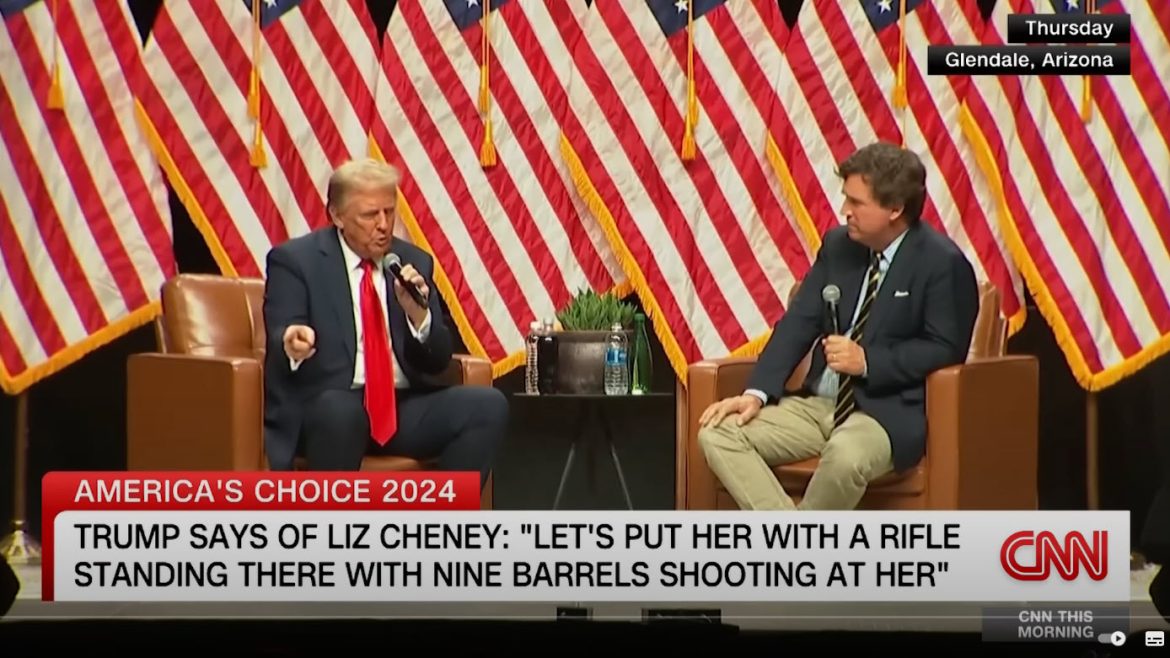Arizona Attorney General Kris Mayes has launched an investigation into former President Donald Trump’s recent comments about former Congresswoman Liz Cheney, after he suggested that Cheney “wouldn’t be such a radical war hawk if she had guns trained on her face.” Mayes, a Democrat, stated that her office is evaluating whether Trump’s remarks constitute a death threat under Arizona state law, noting that such language could escalate tensions as the country nears election day.
The controversy began when Trump made the remarks during a high-profile interview with conservative commentator Tucker Carlson in Glendale, Arizona. Trump’s comment, referencing Cheney’s strong stance on military intervention and national defense, drew swift criticism from across the political spectrum, with many condemning it as an irresponsible statement, particularly in today’s politically charged climate. Cheney, a former Republican congresswoman from Wyoming, has been a vocal critic of Trump and is known for her outspoken positions on foreign policy and defense.
Attorney General Mayes emphasized that while she has not yet concluded whether Trump’s words qualify as a death threat under Arizona law, she is concerned about the impact such rhetoric could have on voter safety. “It’s not helpful as we try to keep peace at polling places,” Mayes remarked in an interview with local news outlet 12News, adding that her criminal division chief has been instructed to conduct a thorough review of Trump’s statement.
The Trump campaign quickly responded to the backlash, stating that the former president’s comments were aimed at “warmongers who are very quick to start wars and send other Americans to fight them, rather than go into combat themselves.” A campaign spokesperson clarified that Trump was not making a literal threat against Cheney, but was instead underscoring his long-held belief that politicians who advocate for military action should be willing to experience its consequences firsthand.
However, Trump’s remarks have sparked a strong reaction from Cheney’s allies and the Harris campaign, with Vice President Kamala Harris denouncing the former president’s statement. Harris argued that Trump’s comments should “disqualify” him from the 2024 presidential race, suggesting that such rhetoric is dangerous and unbefitting of a national leader. Cheney, although no longer in office, has maintained a high profile as a Republican critic of Trump, drawing both support and criticism for her positions within the GOP.
Political analysts observe that this investigation could have significant implications as the campaign season enters its final stretch. Mayes’ review of Trump’s comments may set a precedent for how state authorities handle inflammatory language from public figures, particularly when it could be perceived as a threat. Legal experts note that while freedom of speech is constitutionally protected, certain statements that imply or advocate violence could violate state and federal laws if they are found to incite harm.
For now, Mayes has urged caution while her office completes its investigation. “We’re treating this matter with the seriousness it deserves,” she told reporters, emphasizing the importance of maintaining a safe and respectful political environment, especially in a polarized electoral landscape.
As the legal review unfolds, Trump’s controversial comment remains a flashpoint in the 2024 campaign, raising questions about the limits of political rhetoric and the responsibilities of public figures in promoting a secure democratic process.



